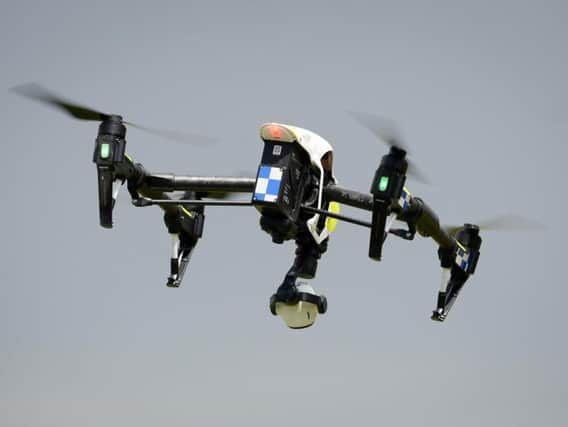Police look to drones for air support over cost and waiting times of helicopters, watchdog finds


Around two-thirds of forces in England and Wales own or have access to unmanned aircraft and only six are not considering using them, according to a report.
At the same time, a watchdog has found police helicopters take so long to get to crime scenes that thousands are called off mid-air because the incident has already finished.
Advertisement
Hide AdAdvertisement
Hide AdThe amount spent on drone technology varies hugely between forces, with Surrey Police and Sussex Police jointly spending £300,000 on five drones while Durham Constabulary bought one for £1,450.
It was reported earlier this year that Northumbria Police officers were planning to loan a drone from the Tyne & Wear Fire and Rescue Service to help tackle problem bikers.A report by Her Majesty's Inspectorate of Constabulary and Fire and Rescue Services into the National Police Air Service (NPAS) has raised concerns about the piecemeal approach to unmanned aircraft in different forces.
Guidance for police on how and when to use drones and other air services was "patchy at best" and has led to "confusion among frontline officers" about their use, it added.
"While most forces have purchased drones, none has rigorously evaluated their use and, as a result, the police service has not developed a common view on their relative merit as a form of police air support," the report said.
It found that:
Advertisement
Hide AdAdvertisement
Hide Ad:: A total of 28 forces in England and Wales have purchased or have access to least one drone.
:: Most have purchased two or three and the Metropolitan Police has 12.
:: Another nine forces are considering purchasing or arranging for access to the technology.
:: Only six forces have not formally considered drone use.
:: The cost of individual drones bought by forces ranged from £1,450 to £60,000.
Advertisement
Hide AdAdvertisement
Hide AdThe report has called for an evaluation of the cost-effectiveness and potential uses of drones, which are not currently operated by NPAS.
Helicopter delays
More than 40% of police helicopter call-outs last year were cancelled because the incident was over before air support had arrived, according to an independent probe.
In many areas it took more than half-an-hour for a helicopter to reach the scene.
North East forces have among the speedier average response times for helicopter call-outs
Advertisement
Hide AdAdvertisement
Hide AdNorthumbria's is 17 minutes 36 seconds, Durham's is 19 minutes 13 seconds, and Cleveland's is 18 minutes 12 seconds.
The national average is 30 minutes and 58 seconds.
Officers also suggested that an increase in police chases was due in part to criminals believing they did not have ready access to air support.
A report by Her Majesty's Inspectorate of Constabulary and Fire and Rescue Services discovered a number of flaws in the National Police Air Service (NPAS) and is calling for urgent reforms.
HM Inspector of Constabulary Matt Parr, who led the inspection, said: "Savings have primarily been made by cutting the service provided to forces rather than increasing efficiency.
Advertisement
Hide AdAdvertisement
Hide Ad"An inconsistent service means that many incidents requiring air support are over before a before helicopter can arrive."
He also said there were "high levels of skill, dedication and commitment" among staff but "fundamental problems" with how the service was structured.
Long response times have contributed to a decline in forces using air support, especially in police chases, the report found.
One unnamed city force reported that the number of pursuits had more than tripled, from 100 in 2014 to 336 in 2016, due in part to a "criminal perception that the police no longer had ready access to helicopter support".
Advertisement
Hide AdAdvertisement
Hide AdThe report said: "Officers in some forces told us that most pursuits ended before an aircraft could arrive."
There were 57,562 calls in England and Wales last year, of which 24,873 were cancelled after the helicopter had been dispatched.